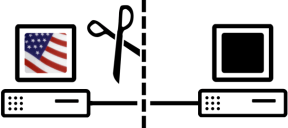
The Stanford Law Review has posted a concise and informed takedown of SOPA and PROTECT-IP, the bills currently creeping their way towards votes in their respective legislative bodies. They make many of the same objections I brought up in my article Kill Switch, but with fewer words and more authority.
The piece was authored by Mark Lemley, David S. Levine, and David G. Post — from Stanford, Elon, and Temple Universities respectively — and touches on a few finer legal matters, such as the acts’ nullification of due process and the questionable constitutionality of the whole thing.
It’s brief and worth a read, but here are a couple highlights:
As you may know, SOPA was recently in the House Judiciary Committee and delayed on account of dozens of objections and amendments, almost none of which were accepted. But instead of being delayed until January, which would give time for both sides to further entrench themselves, another session was scheduled for Wednesday, at which time it is expected to be approved for reading and vote in the House.
Once there, it could still fail to pass, and then there is the threat of veto, but Obama has been quiet on the issue. It’s odd, considering the administration was very clear about its position on net neutrality.
As in some other debates, all the experts and those with no financial involvement are lining up on one side, and threatened business interests are lining up on the other. It may be too late to affect the vote of your representative, but it can’t hurt to forward articles like the Stanford Law Review one, which could make for powerful ammo in a floor debate.
Source:http://techcrunch.com/2011/12/19/stanford-law-review-sopa-unconstitutional-and-would-break-the-internet/
The piece was authored by Mark Lemley, David S. Levine, and David G. Post — from Stanford, Elon, and Temple Universities respectively — and touches on a few finer legal matters, such as the acts’ nullification of due process and the questionable constitutionality of the whole thing.
It’s brief and worth a read, but here are a couple highlights:
Directing the remedial power of the courts towards the Internet’s core technical infrastructure in this sledgehammer fashion has impact far beyond intellectual property rights enforcement—it threatens the fundamental principle of interconnectivity that is at the very heart of the Internet.
The Supreme Court has made it abundantly clear that governmental action suppressing speech, if taken prior to an adversary proceeding and subsequent judicial determination that the speech in question is unlawful, is a presumptively unconstitutional “prior restraint.” In other words, it is the “most serious and the least tolerable infringement on First Amendment rights,” permissible only in the narrowest range of circumstances. The Constitution requires a court “to make a final determination” that the material in question is unlawful “after an adversary hearing before the material is completely removed from circulation.”
The procedures outlined in both bills fail this fundamental constitutional test.
The procedures outlined in both bills fail this fundamental constitutional test.
At a time when many foreign governments have dramatically stepped up their efforts to censor Internet communications, these bills would incorporate into U.S. law a principle more closely associated with those repressive regimes: a right to insist on the removal of content from the global Internet, regardless of where it may have originated or be located, in service of the exigencies of domestic law.
Strong words, but this bill is strong medicine. The New York Times and Reuters both posted some commentary related to lask week’s discussions and some choice excerpts from the bills’ proponents. I like Fox Filmed Entertainment’s Tom Rothman’s chestnut that “Our mistake was allowing this romantic word — piracy — to take hold.” While I agree that sometimes the lexicon can affect social trends, I don’t think that people really conflate illegal online activities with adventure on the high seas.As you may know, SOPA was recently in the House Judiciary Committee and delayed on account of dozens of objections and amendments, almost none of which were accepted. But instead of being delayed until January, which would give time for both sides to further entrench themselves, another session was scheduled for Wednesday, at which time it is expected to be approved for reading and vote in the House.
Once there, it could still fail to pass, and then there is the threat of veto, but Obama has been quiet on the issue. It’s odd, considering the administration was very clear about its position on net neutrality.
As in some other debates, all the experts and those with no financial involvement are lining up on one side, and threatened business interests are lining up on the other. It may be too late to affect the vote of your representative, but it can’t hurt to forward articles like the Stanford Law Review one, which could make for powerful ammo in a floor debate.
Source:http://techcrunch.com/2011/12/19/stanford-law-review-sopa-unconstitutional-and-would-break-the-internet/

No comments:
Post a Comment